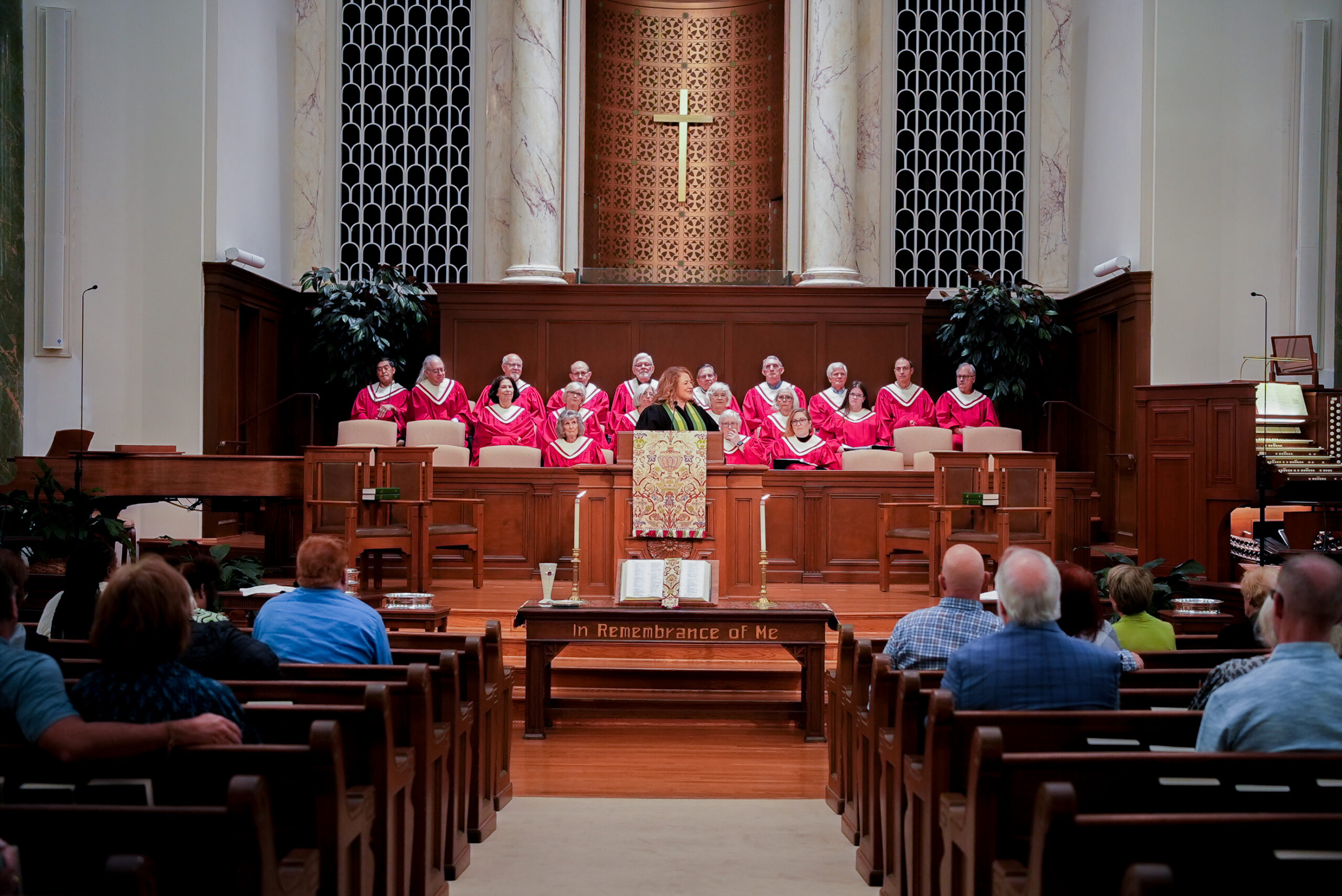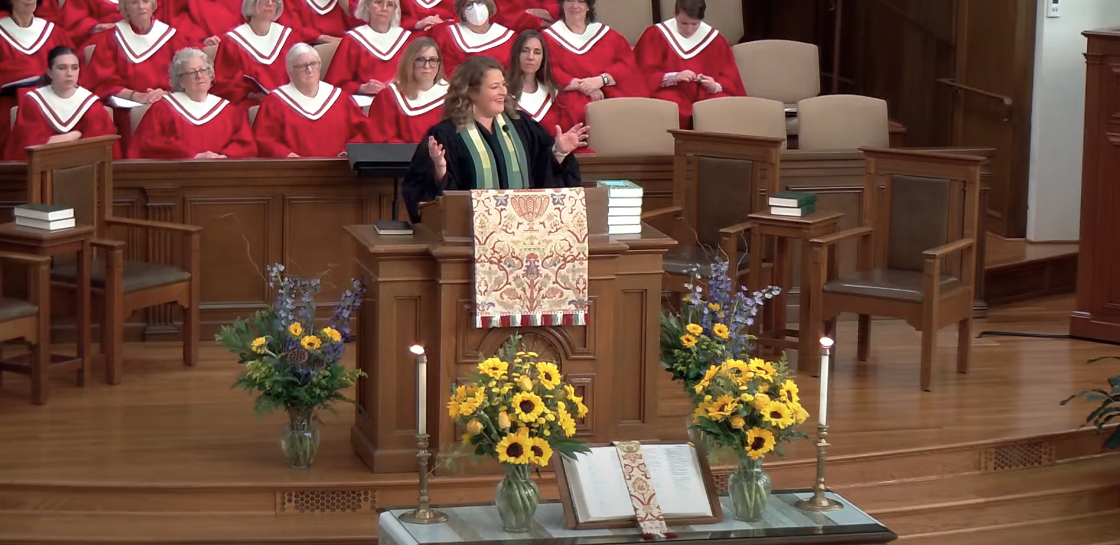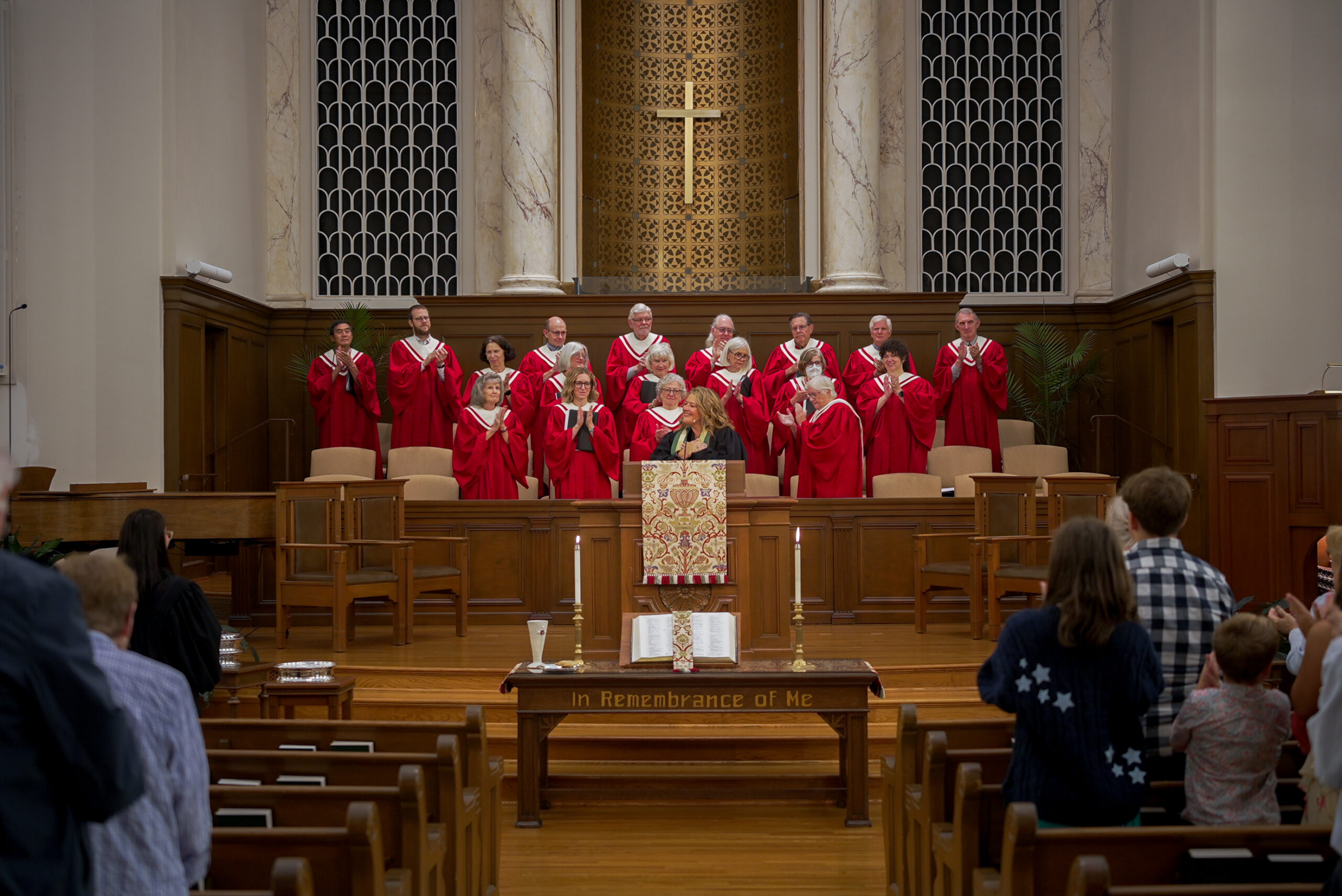IYou’ve heard me tell pastor Tom Long’s story, where, as the brand new pastor of a small church, he decided to try out a new teaching opportunity — a pastor’s Sunday school class called ‘Christianity 101,’ or something like that. Like many young pastors, he showed up the next week sure to find a throng of people there eagerly to hear him, but was immediately surprised by what he saw. For there in the room were but three elementary school girls, ready to learn from their pastor. Dr. Long tried to hide his disappointment at so sparse a crowd and instead poured himself into the teaching of these young folks.
The week before Pentecost Sunday, he asked them if they knew what Pentecost was. They didn’t, so Dr. Long excitedly began to paint a picture of that wild and holy day. “Pentecost,” he said, “was the day when the church was seated in a circle, and tongues of fire came down from heaven and landed on their heads, and they spoke the gospel in all the languages of the world!” Reflecting later on their response, Dr. Long remembered that”two of the little girls took that rather calmly, but one of them got her eyes as big as saucers. And when she could finally speak, she said, ‘Reverend Long, we must have been absent that Sunday!’”
“The beautiful thing about that is not that she misunderstood,” Dr. Long says. “The beautiful thing is that she thought it could have happened in our church, that God’s Spirit could have come even to our little congregation and given us a word to speak that the world desperately needs to hear.”1
IIEvery year as Pentecost rolls around in the rhythms of the church, we turn back to that first day, remembering those wild and holy moments of wind and fire, and wondering how or if or when the Holy Spirit might sweep in again. Because as we’ve talked about, Pentecost marks the birth of the church, God’s people tasked with sharing the good news and bringing about God’s dream of Love right here on earth. This is where it all began, and as we look back, we do so almost as if we were looking at baby pictures to make sense of the grown person in our gaze. “Oh he’s been making that same expression since day one!,” we say. Or, “she’s never outgrown that button nose.” Pentecost gives the church the fine and necessary opportunity to go back to the very beginning: to remember the origin story of us, to trace threads from then until now, to reclaim that wonder that the Spirit could move in such a way even still, and to reject that incorrect assumption that “the Spirit has mellowed with age.”2
Among the many cacophonies of this text, I want us to lean into the immediate aftermath of the Spirit’s descent. After the rushing wind, after the tongues of fire, after this divine stirring that changed the world – then what happened? What was the Spirit’s impact on the people? What did the Spirit have them to do? Because more than 2000 years later, I think it’s there that we might have a clue about what the Spirit calls us to do, and how we are to be the church. And what was the Spirit’s impact? Unmuting, understanding, unhindering.
(Let me just say – this preacher’s sermons rarely – if ever! – trisect neatly into a three part, alliterative sermon, so when they do, she gives credit to the Holy Spirit where credit is due and has a little fun with it!)
IIIThe Spirit unmutes.
If you’re like me, after more than three years and far more pandemic-era Zoom calls than any of us ever expected, you almost can’t hear the word ‘unmute’ and not think of the times that someone said, “Betty, I think you’re on mute!” We know what it feels like to be silent or silenced, to speak and not be heard. Yet here, the Spirit unmutes! After the Spirit comes, Acts tells us that “all were filled with the Holy Spirit and began to speak in other languages, as the Spirit gave them ability.”
Perhaps this is my occupational hazard to celebrate this, but I love that the first thing that happens when the Spirit arrives is that people are given words to say. Words! For words create worlds. This is a thread we can trace back to the very beginning! God the Creator spoke the world into being. Jesus the Redeemer came as word made flesh. The Holy Spirit gave gifts of speech. Each part of the holy Trinity, with a commitment to presence and nearness and intimacy with the one on the other end of the spoken word. Writer Jonathan Merritt said, “God birthed us with words, and now we find ourselves in constant labor, giving birth ourselves through the power of words.”3 To that, I’d add: through the words we receive and share, we, the church, deliver good news into the world! We love, we lead, we teach, we correct, we learn, we grow – all impossible if not for the language that we share.
How painfully we know that too often, the church has taken the power to speak and abused it. For all the ways the church has spoken words of harm and injustice, words that silence some for the sake of those in power, words that wound and break down – for these, the church must always reckon, and reconcile, and repair.
How regretfully we know that too often, the church has been silent: not speaking up in the face of injustice, not speaking when we are called to deliver good news, not speaking when we feel stuck in the middle and don’t really know what to do, where we would rather keep the peace than speak the truth.
This reality makes me think of the old adage of the Christian life that speaks to how we show up for each other. It says, “people won’t remember what you said, they’ll remember how you made them feel.” I have surely said those words; perhaps you have too! Yet while I can appreciate this sentiment, I wholly reject this dichotomy. It’s neither this nor that, it’s this and that! We don’t let our words off the hook as we show up for one another. The words we share matter deeply, wholly, profoundly in the shaping of relationships. “I love you” gives us grounding and being, of which “I’m leaving” shatters. “You’re never alone,” holds us when everything falls apart, and “everything happens for a reason” slams shut the door. The words we say matter in how we show up for each other, and I don’t think it’s a coincidence that the first action of the church is to speak! So church, even as the Spirit unmutes, may we proclaim with wisdom and justice, with compassion and love!
And of course, it’s not just about what we say (or, of course, how we say it – shout out to the spouses in the room who have said that this past week!), but it’s about who says it! When Acts tells us that “all were filled with the Holy Spirit and began to speak,” “all” really does mean all! Later as Peter quotes from the prophet Joel speaking for God to make sense of what is happening: “I [God] will pour out my Spirit upon all flesh, and your sons and your daughters will prophesy, and your young men shall see visions, and your old men shall dream dreams. Even upon my slaves, both men and women, in those days, I will pour out my Spirit, and they shall prophesy.” All the people – the Parthinians, Medes, Elamites, Mesopotamians, Judeans, Cappadocians, Pontians and Asians, Phrygians and Pamphilians, Egyptians, Lypbians, Cyrinians, Romans, Jews, Cretans, Arabs! All the people – sons and daughters, young and old, slaves and free, men and women and all. Is there anyone left out? Decidedly not. The Holy Spirit is inclusive from the very beginning. The Spirit moves, and all the people speak, pouring forth words and filling the air with “syllables of faith.”4
Yet for hundreds of years, the church seems to have forgotten how it all began. With every attempt to silence, every attempt to wrest power, every attempt to police the pulpit and temper the testimony, some in the church are trying to hit the mute button on those they’d rather not speak, forgetting that the Spirit was the Great Unmuter from the start!
So to those who would complain about who God is calling to speak, to those who would suggest some are worthy to bear the good news and others should stay silent, I say take your grievance to God! Send your call to the manager, who is Jesus! File your complaint with the Holy Spirit! Your objection is not with people, it’s with God whose Holy Spirit fell upon all flesh.
IVThe Spirit grows understanding.
Again from Tom Long: he notes that among the astounding acts of Pentecost was in the gathered community itself – for, you see, a number of these groups mentioned were ones who had been long gone for years. The Medes? Extinct as a nation for more than 200 years. The Elamites? Last mentioned hundreds of years prior in the Book of Ezra! As he once said, this passage from Acts 2 is like saying, “You should have been there! We had a huge number of visitors for the service. Some were all the way from Montana! Some were from Arizona, Michigan, not to mention a whole van load of Assyrians, a couple of Babylonians and even a nice little Hittite couple who asked to be baptized.”5
The loud crowd of observant Jews, gathered in Jerusalem for Shauvot, were bewildered. Shocked. Dazed and confused. What stunned each one wasn’t merely that they heard the many native languages, but rather that they understood them all! Even the Medes and the Elamites! “How is it that we hear, each of us, in our own native language?” From the many languages, one. From the many people, one Spirit. From the many experiences, one understanding.
Let’s think for a minute about understanding, how we communicate about it, and what it means to us, and when we withhold receiving and giving it. I think of some situations like these: you have an experience of a lifetime, come home to tell your eager family about it, and finish a thrilling slideshow of photos and memories with a flourish: “it was just so amazing; you’ll never understand what it meant to me.” You struggle with the increasing demands placed on you at every level – as spouse and parent and child and worker and neighbor and friend – and when another tries to listen with compassion, you stop them firmly: “you just can’t understand what I’m going through.” You endure suffering at the most profound level, pain that knows no end, fear that invades your every thought, trauma from which you still haven’t recovered, yet why share about it with your friends? Why seek therapy? Why talk about it at all? “No one will ever understand,” you tell yourself. I think when we do this, we lift understanding to the level of compassion, assuming in a relationship that there are limits to our compassion, our empathy, patience, grace, even love where there cannot be full and abiding understanding. Sometimes that even looks like equating understanding with agreeing, like thinking, “if you don’t agree with me on [fill in the blank topic], you’ll never understand me. And if you don’t understand me, you can’t know me. And if you don’t know me, you can’t love me!” In a world of competing values and needs, understanding becomes the highest form of currency we trade.
And yet, who understands completely? Not a one of us, for any event that happens in any of our lives. God, not us.
Take this interpersonal reality, and layer it with our contemporary cultural context, and it might feel like understanding can’t even be the goal, when it seems like we’re speaking different languages altogether! Think about it. A covid denier and a ER nurse seek understanding? A proud NRA member and a victim of gun violence seek understanding? A rural farmer and a university president seek understanding? A scared, sheltering parent and a drag queen seek understanding? A white supremacist and a Black citizen seek understanding?I’m thinking it was easier for the Medes and Elamites than it is for us!
And yet.
Church, I think the hard truth is this: even as much as we might long to write off and dismiss those who we can hardly bear to listen to, much less understand or know or love, we the church have to be the first to try. Not to be unsafe, but to be available for understanding to catch us by surprise, almost like a breath of the Spirit. That’s in our DNA, right from the start. For the Holy Spirit didn’t just give words, she gave understanding. Astounding and perplexing as it may be, but understanding nonetheless.
The late Rachel Held Evans understood it when she said this: “the church is not a group of people who believe all the same things; the church is a group of people caught up in the same story, with Jesus at the center.”6 That’s our story, friends. The church is at her best when Jesus is right at the center, and she’s “mixing differentness with togetherness”7
VThe Spirit unmutes. The Spirit gives understanding. And the Spirit moves unhinderedly.
If your mind works like autocorrect on my Google Doc, you might think to yourself, “unhinderedly” isn’t a word! Google would agree! (My dad shared this word with our A Survey of the Bible class on Acts!) Yet if you turn in your Bible to the very last word of Acts – akalutos – unhinderedly. Perhaps your
translation softens the Greek a bit in the narrative of Paul to read like this: “he lived there two whole years at his own expense and welcomed all who came to him, proclaiming the kingdom of God and teaching about the Lord Jesus Christ with all boldness and without hindrance.” Through the power of
the Holy Spirit, the gospel moves without hindrance, unhinderedly! All throughout the stories of Acts, we hear witness after witness who tell us of this unhindered good news. Breaking past barriers of tradition. Upending conventions of race. Moving through suffering. Shifting customs and differences. Liberating the chains that have imprisoned us. “Who am I to hinder God?”, Peter says. Indeed, the Holy Spirit is a Holy Unhinderer, and the church is at her best when she follows suit! It’s when we try to curb and contain what God has already released, when we try to mute and silence and distance, that is when we fail the very task given to us on the day of our birth.
Biblical scholar Robert Wall says: “The ending of Acts does what good endings to excellent stories always do: it moves the readers from the world of the story to their own more complicated real worlds.”8 Friends, that’s what the Spirit of God did on Pentecost. That’s what the Spirit of God does even still. And you know what? What if we thought that this unmuting, understanding, unhindering work could happen right here in our church, even today, even this very hour?
To that wonder, we hear from St. John of Damascus: “To me who am but black cold charcoal, grant, o Lord, that by the fire of Pentecost, I may be set ablaze.”9
Amen!





